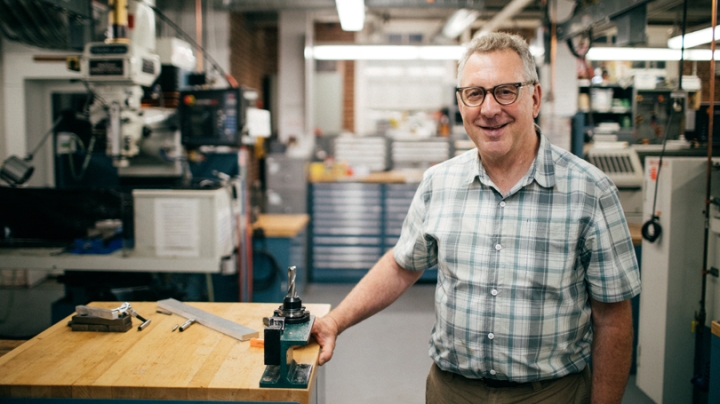At the entrance to the machine shop in the basement of Thayer School of Engineering, a tongue-in-cheek sign warns, “Due to a shortage of robots, humans are working here and may behave unpredictably if abused.”
Human beings do, indeed, make things in this space every day, and Lee Schuette, the operations manager, serves as an instructor and guide, helping students design and build their projects.
Outside of Dartmouth, he creates his own sculpture, fine furniture, and architectural woodwork. Among the most original pieces in his portfolio: whimsical folding tables in the shape of trees, a literal “lawn chair” whose back is a rake and whose seat sprouts grass, and an armchair made from clear plastic bags filled with woodchips. Schuette says he enjoys transferring knowledge he’s gained in arts and design to the work he does at Thayer.
This staff snapshot is part of the Lone Pine Recognition Program for Dartmouth College Staff.
Job Title: Manager of Operations, Thayer Machine Shop
You bring to Dartmouth over 25 years of experience in designing and building—everything from houses to shoes—and you have also taught in college and high school. How and when did you land at Thayer School of Engineering?
I’ve come full circle, in a way. I am a New Hampshire native, and I’ve lived a lot of places—from Maine to Seattle to Halifax. My wife, who is Japanese, and I came back to New Hampshire a few years ago to care for ailing parents, and to work through her immigration process. While I was teaching at Keene State College, I organized a symposium about maker spaces. That’s when I met Kevin Baron, who directs the machine shop at Thayer, and he hired me to manage operations.
What’s your role in the shop?
I oversee staff and do the scheduling, and I also am a technical instructor. We have structured meetings with classes and we also meet informally with students, getting them materials they need and showing them how to operate equipment.
You’ve worked both inside and outside of academia. What did you learn at Timberland shoe corporation, for example, that you are applying at Dartmouth?
My manager there had me doing all kinds of stuff I had never done before, including working on a synthetic-leather project. I said to him, I don’t know anything about synthetic leather, and he said, “You just have to learn the language for that. Every venture has its own language and once you learn it, you can manage it.”
That was a valuable lesson for me, and, as an artist walking into an engineering school, I hope I have passed that along at Dartmouth.
Can you give an example of a particularly interesting project you have helped to guide that marries art and engineering?
Recently I worked with a cocurricular class taught by Ted Levin (the Arthur R. Virgin Professor of Music) and Ulrike Wegst (an associate professor of engineering), where students designed and built their own instruments. We came up with four different kits that they used to make things like flutes, mouth harps, banjos, and drums. Another class came up with a better bagel cutter. I brought them an electric knife, and they bought more on Amazon and started taking them apart. I think the contribution I made there, as a woodworker, was to introduce them to joinery. I helped them design a puzzle-like structure that could be disassembled and put in the dishwasher.
What’s your favorite part of the job?
The students are really amazing. They know how to say please and thank you and when they say they are going to do something, they do it. The majority follow up, and they approach everyone with respect. What I’d like to help them do more of is work sustainably, using renewable materials that have less of an impact on the environment. I like sharing ideas. What I think I can offer this digitally empowered generation is the satisfaction of making things with your hands. I see great promise here. Our students are dedicated to doing and making, and that’s really my background, whether in art, product design or teaching. This job is a good match for me because it lets me apply a lot of transferrable skills that I’ve gained from all those experiences.
How much of your own design work are you able to do, after you leave the machine shop each day?
Well, I had my kids pretty late in life and our family has moved around a lot, so there hasn’t been a lot of opportunity for me lately to pursue my art. But now that we are settled in the Upper Valley, I’m going to build an addition to my house, for a studio. I want to build some public seating for museums, and I have a couple of other design ideas for a product line I’m not quite ready to unveil yet.
Charlotte Albright can be reached at charlotte.e.albright@dartmouth.edu.


